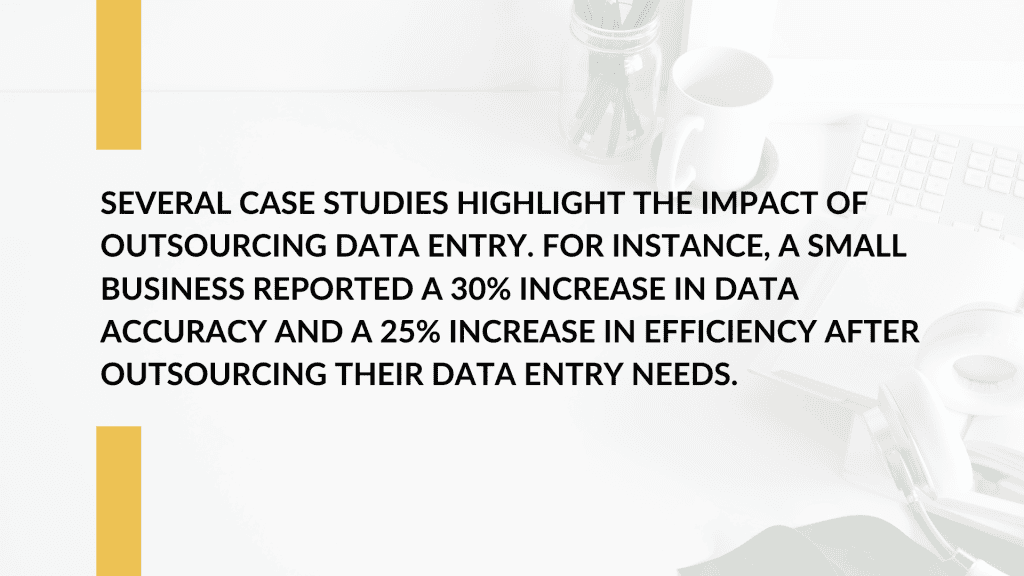Outsourcing data entry has become a pivotal strategy in modern business operations. The rapid digital transformation and increasing need for efficient data management have made this service invaluable. By opting for outsourcing data entry, companies can focus on core business processes, ensuring growth and efficiency.
- Cost-Effectiveness and Cost Reduction: Outsourcing data entry is a cost-effective business strategy. It eliminates the need for in-house resources and infrastructure, significantly reducing overhead costs. Companies can leverage affordable outsourcing data entry solutions, leading to substantial savings and better allocation of financial resources.
- Enhanced Efficiency and Time Management: With professional virtual data entry assistance, businesses benefit from improved efficiency. Tasks are completed swiftly, allowing for better time management. This efficiency is further boosted by automated data entry systems providers, ensuring fast and accurate data entry services.
- Data Security and Data Accuracy: One major concern in data entry is maintaining confidentiality and accuracy. Secure offshore data entry services ensure that sensitive information is handled with the utmost security. Additionally, these services prioritize data entry accuracy, minimizing errors and ensuring high-quality data management.
- Access to Expertise and Advanced Technology: Outsourcing to specialized data entry outsourcing companies provides access to expert knowledge and advanced data entry technology solutions. This expertise is crucial for handling complex data entry projects effectively.
- Remote Work and Global Talent Access: The rise of remote data entry service providers allows businesses to tap into a global talent pool. This access to diverse expertise can enhance business processes and promote innovation.
- Business Growth and Strategy Alignment: By outsourcing data entry, businesses can realign their strategies to focus on core competencies, fostering growth. It also aids in workforce management, as resources can be better allocated to strategic areas.
- Digital Transformation Support: In an era of digital transformation, outsourcing data entry tasks supports the transition to digital platforms. It facilitates efficient BPO for data entry, ensuring that businesses stay competitive and technologically advanced.
Outsourcing data entry tasks offers cost efficiency, allowing businesses to focus on core activities. It ensures accuracy and quality with skilled professionals. Flexibility and scalability are enhanced, adapting to varying workloads. Access to advanced technology and expertise improves efficiency. Outsourcing also saves time, enabling quicker project turnaround.
Outsourcing Data Entry
Outsourcing data entry refers to the practice of hiring third-party service providers to manage data entry tasks, a process increasingly embraced across various industries. This shift from in-house to outsourced data entry highlights a strategic approach in business process management, prioritizing cost-effectiveness, efficiency, and data accuracy.
In-House vs. Outsourced Data Entry
| Aspect | In-House Data Entry | Outsourced Data Entry |
| Cost | Higher due to employee salaries, infrastructure | Lower, benefitting from economies of scale |
| Efficiency | Varies based on in-house team expertise | High, due to specialized focus on data entry |
| Data Security | Dependent on internal protocols | Contractually guaranteed by service providers |
| Data Accuracy | Subject to staff proficiency | Often higher due to specialized skills |
| Time Management | Can be time-consuming for internal teams | Frees up internal resources |
| Workforce Management | Requires dedicated staff and training | Managed by the outsourcing company |
Industry Trends in Outsourcing Data Entry Tasks
Data entry, a crucial component of digital transformation, is witnessing a growing trend towards outsourcing. Industries ranging from healthcare to finance are increasingly relying on outsourced data entry services for efficient data management. This shift is driven by the need for cost reduction and the desire to focus on core business strategies.
Outsourcing Benefits and Business Growth
Outsourcing data entry brings numerous benefits, including improved efficiency and cost-effectiveness. Businesses leveraging outsourcing can redirect their focus towards growth and innovation while outsourcing partners handle the data entry tasks. This model is integral to modern business strategies, facilitating digital transformation and effective data management.
Outsourcing Entities and Their Roles
- Remote Work: Outsourced data entry often involves remote work setups, providing flexibility and access to a global workforce.
- Data Security: Ensuring data security is paramount in outsourcing, with companies adopting stringent measures for data protection.
- Data Accuracy: High data accuracy is a hallmark of professional data entry services, critical for informed decision-making.
- Time Management: Effective outsourcing aids in better time management, allowing businesses to focus on core operations.
- Cost Reduction: One of the primary advantages of outsourcing is significant cost reduction, without compromising on quality.
Meeting the Challenges: Ensuring Quality in Outsourcing Data Entry
While outsourcing offers numerous benefits, it’s crucial to address challenges like choosing the right provider and ensuring data security. Opting for providers who follow best practices in data entry outsourcing and understanding the impact of outsourcing on data quality are essential steps.
Choosing the Right Outsourcing Partner: Factors to Consider
- Data Entry Outsourcing Cost: Evaluate the cost-effectiveness of the service.
- Data Security Measures: Ensure the provider adheres to stringent data security protocols.
- Expertise and Reputation: Consider the provider’s expertise in data entry and their market reputation.
- Technology Utilization: Assess the technology and tools used for data entry and processing.
Cost-Effectiveness
Outsourcing data entry has become a pivotal strategy for businesses seeking to enhance efficiency and cost-effectiveness. By comparing the financial implications of in-house versus outsourced data entry, we can understand how this approach contributes to business growth and strategy.
Cost Comparison: In-House vs. Outsourcing Data Entry
A primary advantage of outsourcing data entry lies in its cost-saving potential. When businesses handle data entry in-house, they incur significant expenses, including salaries, benefits, and office space. However, when outsourcing data entry, these costs are significantly reduced. For example, a case study from a mid-sized company showed a 40% reduction in costs when switching to an outsourced model. This is due to the reduced need for physical infrastructure and the ability to tap into a global talent pool, often at a lower cost.
Enhancing Business Process and Efficiency
Outsourcing data entry not only aids in cost reduction but also streamlines business processes. With professional data entry services handling the meticulous task of managing data, businesses can focus on core activities, leading to increased efficiency and productivity. This is particularly relevant in the context of digital transformation, where data management becomes increasingly complex.
Impact on Remote Work and Data Security
In today’s digital age, where remote work is prevalent, outsourcing offers an adaptable solution. Data entry outsourcing companies often provide secure data entry services, ensuring data accuracy and protection. This is crucial for maintaining data security, a key concern for many businesses.
Time Management and Workforce Management
Another significant benefit is the optimization of time management and workforce management. Outsourcing data entry allows for faster data processing, thanks to specialized expertise and technology. This efficiency not only saves time but also allows for better allocation of human resources, contributing to overall business strategy and growth.

Incorporating Advanced Technologies
Outsourcing companies often use advanced data entry technology solutions, including automated data entry systems. These technologies ensure fast and accurate data entry services, enhancing overall data quality. For businesses aiming for digital transformation, these technological advancements are invaluable.
Enhanced Accuracy and Quality
Outsourcing data entry to specialized firms results in significantly higher accuracy, a critical aspect in today’s data-driven business environment. This approach combines the strengths of advanced technologies and trained professionals, leading to a remarkable improvement in data quality. For instance, a leading healthcare provider reported a 30% increase in data accuracy after outsourcing their data entry tasks to a specialized agency.
The use of advanced technologies like AI and machine learning algorithms in outsourced data entry ensures meticulous attention to detail, often surpassing human capabilities. For example, AI-powered data entry systems can process large volumes of data with high precision, reducing errors significantly. This technological integration, combined with the expertise of professional data entry specialists, ensures that the data is not only accurate but also relevant and up-to-date.
Outsourcing data entry also plays a crucial role in effective data management and workforce management, contributing to overall business growth. It allows businesses to focus on core operations while ensuring that their data entry needs are managed efficiently by experts. This approach aligns with contemporary business strategies focused on cost-effectiveness and digital transformation.
In terms of data security, outsourcing to reputable firms ensures that the data is handled in a secure environment. These firms often employ stringent data security measures, adhering to global standards, to protect sensitive information. This aspect is particularly important for businesses dealing with confidential data, where data security is paramount.
From a cost perspective, outsourcing data entry proves to be a cost-effective solution. By leveraging remote work and offshore data entry services, businesses can enjoy lower operational costs without compromising on quality. For small businesses, this approach is especially beneficial as it allows access to professional data entry services at a fraction of the cost of in-house operations.
Conclusion
Outsourcing data entry is a strategic move that brings numerous benefits to businesses of all sizes. Embracing this approach can significantly enhance business efficiency. By delegating data entry tasks to specialized service providers, companies can focus on core activities, driving strategic growth and innovation.
Cost-effectiveness is a standout advantage of outsourcing data entry. Businesses can reduce expenses associated with hiring in-house staff, such as salaries, benefits, and training costs. Additionally, outsourcing often leads to lower operational costs, as providers often operate in regions with lower labour costs. This cost reduction is pivotal for companies looking to optimize their budgets while maintaining high-quality data management.
Efficiency gains are another major benefit. Outsourcing data entry to professionals ensures fast, accurate data processing, contributing to better time management within the organization. This efficiency is crucial for companies dealing with large volumes of data. Providers often use advanced data entry technology, ensuring not only speed but also high accuracy levels, which is essential for effective data management and decision-making.
Regarding data security, outsourcing to reputable data entry firms means that businesses benefit from high levels of data protection. These companies invest in secure data entry systems and adhere to stringent data security protocols, ensuring the confidentiality and integrity of business data.
FAQs
What is outsourcing data entry?
Outsourcing data entry involves hiring a third-party service provider to handle data entry tasks instead of doing them in-house. This can include inputting data into computer systems, processing data, and managing databases. Outsourcing data entry allows businesses to focus on core activities while delegating routine data management tasks to specialists.
How does outsourcing data entry benefit a business?
Outsourcing data entry benefits a business by saving time and resources. It enables businesses to focus on core activities, reduce operational costs, and increase productivity. Outsourcing also provides access to skilled professionals and advanced technology, ensuring high-quality data management and processing.
What factors to consider when choosing a data entry outsourcing service?
When choosing a data entry outsourcing service, consider factors like the provider’s reputation, experience, data security measures, cost-effectiveness, and ability to handle the required volume and type of data. Additionally, evaluate their technical capabilities, turnaround time, and the quality of customer service.
How can outsourcing data entry improve efficiency?
Outsourcing data entry improves efficiency by allowing businesses to allocate their resources more effectively. It frees up internal staff to focus on higher-value tasks, ensures faster and more accurate data processing, and often incorporates advanced technologies and processes that internal teams may not possess.
What are the risks associated with outsourcing data entry?
The risks associated with outsourcing data entry include potential data security breaches, quality control issues, and the possibility of miscommunication due to cultural or language barriers. Dependence on a third-party service provider can also be a risk if the provider faces disruptions.
How does data security work in data entry outsourcing?
Data security in data entry outsourcing involves implementing strict protocols to protect sensitive information. This includes encryption, secure file transfer methods, non-disclosure agreements, regular security audits, and ensuring compliance with data protection laws and regulations.
Can small businesses benefit from outsourcing data entry?
Yes, small businesses can benefit from outsourcing data entry. It provides them with access to expertise and technology that they may not afford in-house. Outsourcing can also help small businesses manage fluctuating workloads and scale operations more efficiently.
What are the costs involved in outsourcing data entry?
The costs involved in outsourcing data entry vary based on factors such as the volume and complexity of data, turnaround time, and the level of expertise required. Costs can be structured as per-project, per-hour, or fixed monthly rates, depending on the service agreement.
How to ensure quality in outsourced data entry services?
To ensure quality in outsourced data entry services, choose a reputable provider with a proven track record. Clearly define project requirements and quality standards, establish regular communication, and monitor performance through periodic audits and feedback mechanisms.
What trends are shaping data entry outsourcing in current times?
Current trends shaping data entry outsourcing include the increasing use of automation and AI for more efficient data processing, a focus on data security and compliance with privacy regulations, and the adoption of cloud-based solutions for greater flexibility and scalability. There’s also a growing emphasis on strategic partnerships rather than transactional outsourcing relationships.






